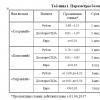Agree, few of us want to pay taxes. How many taxpayers would breathe easier if they learned about their abolition. Maybe we shouldn’t cancel them, but just significantly reduce them? Is this possible or is it unrealistic?
Article 56 of the Tax Code of the Russian Federation defines the concept of “tax benefits”: “tax and fee benefits are those provided to certain categories of taxpayers and fee payers provided for by law on taxes and fees, advantages compared to other taxpayers or payers of fees, including the opportunity not to pay a tax or fee or to pay them in a smaller amount.”
Information on the right to use tax benefits, if there are grounds and in the manner established by the legislation on taxes and fees, is given in sub. 3 p. 1 art. 21 Tax Code of the Russian Federation.
Tax benefits can be grouped in different ways, for example:
- for personal and benefits for legal entities;
- into general and special - for individual categories taxpayers;
- to general economic and social;
- to federal, regional and local (depending on who provided the benefit).
Let us make a reservation that in this article we will talk specifically about benefits, and not about tax preferences. Concept "preference" much wider and includes tax breaks, deferments and installments for the payment of taxes, tax credit etc. Since this topic is quite extensive, we will mainly consider the benefits provided to legal entities.
The basis for granting benefits may be:
- material, financial, economic situation taxpayer;
- special services of citizens to the fatherland;
- the need to develop certain areas and subjects of production, regions of the country;
- social and marital status of citizens;
- environmental protection, etc.
Tax benefits, first of all, are a tool for controlling and stimulating the development of various economic sectors.
The state, if necessary, reduces tax burden for certain taxpayers. On the one hand, it is not profitable for him to use tax breaks, because budget revenues are decreasing. This was also noted by the Minister of Finance of the Russian Federation, Deputy Prime Minister Alexei Kudrin, when he was at the Moscow Tax Conference on November 19, 2010, where he advocated the abolition of most tax benefits. According to RIA Novosti, Kudrin explained his position in the following way: “If we need to cut the deficit by 4.6% of GDP, then eliminating all benefits without raising rates could solve the problem.”
Moscow officials are already decisively cutting tax breaks. In particular, on November 17, 2010, Moscow City Law No. 49 “On Amendments to Article 4 of Moscow Law No. 64 of November 5, 2003 “On Organizational Property Tax” was adopted.” This law adopted norms that increase the land tax rate for sports facilities, as well as depriving scientific institutions, city specialized funeral services, airfields and airports of property tax benefits.
But on the other hand, the lack of immediate benefits can lead to much larger dividends. After all, moderate taxation of legal entities and individuals undoubtedly increases the welfare of citizens and stimulates production. The organization can use the funds released from the use of benefits to develop its own business.
The state is currently paying attention to the development innovative technologies. And it allocated part of the benefits to tax incentives for organizations whose activities are scientific, technical or innovative.
Benefits are provided not only to organizations, but also individuals. This tool is aimed at maintaining social sphere to smooth out social inequality and redistribute income and benefits in society. For example, property deduction. Which individual does not wish to exercise their right to a property deduction provided in the amount spent on new construction or the acquisition of a residential building, apartment or share(s) in them, in the amount actually spent Money, as well as in the amount aimed at repaying interest on targeted loans(loans) received from credit and other organizations of the Russian Federation? Another question is which of us and when this will happen.
Unfortunately, it is worth noting that not all businesses know what benefits they can use. A small number of organizations have specialists at different levels who are ready to study a huge layer of legislation and then defend the rights to these benefits before the fiscal authorities.
Note!Let us note once again that the benefits depend on the type of tax under which they apply and on local legislation. Each subject of the federation is given significant rights in this area, and, as practice shows, a significant part of the benefits is provided by local laws.
Below is a table indicating tax benefits for organizations (the laws of constituent entities of the Russian Federation may provide for other tax benefits for various organizations depending on their type of activity, as well as the grounds for their use by taxpayers).
Tax benefits for legal entities
Tax law Russian Federation provides individuals with various tax benefits.
They are provided with the aim of improving the financial situation and increasing measures social protection citizens in various life situations.
Definition of the concept
A tax benefit is the exemption of an individual from paying tax on certain property or on a certain amount.
Liberation may be full and is provided throughout life, and can be applied reduced rate, or only a certain amount will not be taxed.
Tax benefits may be provided in the following forms:

All of the above types of tax benefits may be used in the following cases if an individual:
- belongs to a certain category of citizens or has a certain status;
- receives income from which you don’t have to pay;
- spends money for certain purposes and receives from this amount;
- has a movable object or Not movable property, which due to special circumstances is not subject to taxation.
Application of tax benefits optional and the person to whom they are entitled independently decides to submit documents to him for their provision or not.
Classification
All tax benefits that an individual can take advantage of are specified in the main document regulating taxes - Tax Code.
Tax deductions
This is a type of tax benefit that allows do not pay tax on the amount, aimed at specific purposes, provided that it has already been paid. That is, a citizen pays for needs that fall under this category, and then submits documents certifying this, and his income within the specified amount is exempt from personal income tax.
Tax deductions There are the following types:

For property
The Tax Code requires payment of tax on any property owned by an individual. But at the same time, this property may be removed from the list of objects that are subject to taxation.
Basic property taxes:

All the above benefits may be provided on an ongoing basis or certain period until the circumstances that caused them disappear.
All types of tax benefits will be provided only upon application. Some will be provided for only one period, and some can be used for several periods (years) at once.
For whom are they used?
Tax benefits may be provided to citizens belonging to certain categories, or may be provided in connection with special status subject of taxation.
Special categories of citizens:
- by age and on preferential pensions;
- Military personnel and;
- Citizens who have;
- Having the title;
- Citizens who participated in the liquidation of the consequences of nuclear disasters (Chernobyl nuclear power plant, Mayak plant);
- participated in ;
- Spouses of citizens who died in the line of military duty, etc. etc.
This list is not exhaustive, it may complement at the local level.
- Any residential premises or its share, provided that the citizen who acquired them did not previously receive a deduction, or received it after 2013 and did not choose the amount of 2,000,000 rubles;
- Residential premises purchased with the help of. The amount of interest paid on this loan is not subject to tax; it is limited to 3,000,000 rubles;
- A car is exempt from tax in some regions if it does not have required quantity Horse power. The amount received from the sale of this property is also exempt from taxation if it meets the following conditions:
- does not exceed 250,000 rubles;
- was owned by the seller for more than 3 years;
- the sale amount is less than or equal to the acquisition amount.
What is needed for registration
In order to receive tax benefits and be exempt from paying tax on a particular object, an individual must submit documents to tax service . The exception to this rule is standard tax deductions, to receive their application and required package documents are provided to the employer.
Documentation, which may be needed when receiving tax benefits that are due to certain categories of citizens:

That is, in order to provide tax benefits in this case, it will be necessary to confirm the citizen’s belonging to preferential category.
If a tax benefit is sought due to the fact that the taxable object can be removed from the taxable list, then it may be necessary following documents:
- Certificate of ownership;
- Technical passport for the car;
- Contract of sale;
- Agreement for the provision of medical services;
- Agreement for the implementation of educational activities;
- Loan agreement for the purchase of residential premises.
This list can also be supplemented if necessary.
Obtaining a tax benefit will not be difficult if a citizen has the right to it and provides the entire package of necessary documents.
To see what benefits there are when paying taxes, watch the following video:
Tax benefit- an advantage provided by the state or local government to a certain category of taxpayers, putting them in a more advantageous position in comparison with other taxpayers. Tax benefits are one of the elements tax policy and pursue social and economic goals.
Types of tax benefits:
Seizures- These are tax benefits that remove certain items (objects) of taxation from taxation. Exemptions may be granted:
On a permanent basis and for a limited period;
Both all tax payers and some specific category of them, for example, are not subject to sales tax on sales of bread and bakery products, milk, children's clothing and shoes, medicines, etc.
Discounts- These are benefits that reduce the tax base. They are divided into:
Limited discounts (the size of the discount is limited) and unlimited discounts (the tax base can be reduced by the entire amount of the taxpayer’s expenses); general discounts (all payers use them, for example, property tax deductions for all payers of personal income tax) and special discounts (valid for certain categories of subjects, for example, 3,000 rubles for disabled WWII when calculating the same tax).
Tax credits- These are benefits that reduce the tax rate or tax salary.
There are the following forms of providing tax credits:
Reduced tax rate;
Deduction from tax salary (gross tax);
Deferment or installment payment of tax;
Refund of previously paid tax, part of the tax (tax amnesty);
Credit for previously paid tax;
Targeted (investment) tax credit. The reduction of the tax salary (gross tax) can be either partial or complete, depending on certain time and indefinitely. A complete exemption from paying tax for a certain period is called a tax holiday.
Conditions for applying tax benefits.
In accordance with Article 1 of the Code, the legislation of the Russian Federation on taxes and fees consists of the Code and federal laws on taxes and fees adopted in accordance with it. According to subparagraph 3 of paragraph 1 of Article 21 of the Code, taxpayers have the right to use tax benefits if there are grounds and in the manner established by the legislation on taxes and fees.
Providing tax benefits by regulations that are not related to acts of legislation on taxes and fees violates the principle of universality of taxation. Changing the tax regime is possible only by making changes and additions to legislative act for a specific tax.
In accordance with Article 7 of the Federal Law of July 31, 1998 No. 147-FZ “On the entry into force of part one of the Tax Code of the Russian Federation,” federal laws and other regulatory legal acts are in force in the part that does not contradict part one of the Code and are subject to being brought into compliance with her.
The differences between regulatory legal acts are determined, among other things, by the subject of regulation of the relevant relations. However, taking into account the transitional provisions, the question of the content of the concept of “legislation on taxes and fees” remained open.
Since determining the location of a legal norm is within the competence of the legislator, under these conditions, in accordance with Article 15 of the Constitution of the Russian Federation, judicial practice recognized the effectiveness of the rules on benefits contained in any laws. With the introduction of taxes established on the basis of the Code, benefits provided for by other legislative acts are not subject to application.
Land tax deduction in the amount of 10 thousand rubles. for pensioners, WWII participants and other beneficiaries entitled to this deduction, they want to increase it to 200 thousand rubles. After all, the current deduction allows you to save only 30 rubles on tax, and the tax base is growing every year due to inflation, and for the period 2007 - 2011. it increased 20.6 times.
Co next year movable property registered as fixed assets from January 1, 2013 will not be subject to property tax. Well, on the movable property that will still be listed on the balance sheet, tax will still have to be paid until it is completely depreciated. The authorities suspect that many owners of previously registered OS will try to save on tax by organizing their “carousel” resale starting in the new year. How they will deal with this has not yet been announced. But they'll probably come up with something...
According to new edition clause 10 art. 217 of the Tax Code of the Russian Federation are exempt from Personal income tax amounts paid by employers for treatment and medical service not only their employees, their spouses, their parents and children, but also their former employees who resigned due to retirement due to disability or old age. The preferential category of recipients of such income now additionally includes adopted children of employees, as well as wards of employees under the age of 18. These amounts are preferential if they are paid from funds remaining at the disposal of employers after paying corporate income tax. Amounts for treatment are still exempt from taxation in the event cashless payment employers medical organizations expenses for treatment and medical care of taxpayers.
Some entrepreneurs and organizations using the simplified tax system have the right to pay insurance premiums for their employees at reduced rates. For the period 2011 - 2012. the general tariff for them is 26 percent (Article 58 of Federal Law No. 212-FZ of July 24, 2009, hereinafter referred to as Law No. 212-FZ). You can take advantage of the benefit if the following conditions are simultaneously met. Firstly, an individual entrepreneur must apply a simplified taxation system. Secondly, the type of activity of the merchant must be indicated in the list given in paragraphs. 8 clause 1 art. 58 of Law No. 212-FZ. Thirdly, the share of income by this species activity must be at least 70 percent of total income, that is, the type of activity is the main one. Three simple conditions, but in practice they raise questions. In addition, the nuances of activity and the peculiarities of calculating income lead to the fact that businessmen cannot take advantage of the benefit.
Commentary on the amendments to Ch. 21, 23 and 25 of the Tax Code of the Russian Federation regarding purchase and sale valuable papers, shares and collectible coins. Commentary to the Federal Law of December 28, 2010 N 395-FZ
The child’s parents, who support him, have the right to receive a monthly personal income tax deduction. This deduction is called the standard personal income tax deduction for children. This means that a monthly portion of your income in the amount of the deduction will not be subject to personal income tax starting from the month the child is born. Therefore, you will pay personal income tax on a smaller amount. To take advantage of the deduction, you need to have income that is subject to personal income tax at a rate of 13 percent. For example, receive wages.
The main purpose of this article is to provide a unified methodological approach to the application of limit values tax rate, as well as providing advice to engineering, technical and accounting employees in determining the list of fixed assets of an organization that are exempt from property tax on the basis of clause 11 of Art. 381 of the Tax Code of the Russian Federation.
To take advantage of the deduction, you must have income that is subject to personal income tax at a rate of 13 percent. For example, receiving a salary. The use of the deduction is that you will reduce the income received for the year by the amount of the deduction. If you did not have income taxed at 13 percent, you will not be able to take advantage of the tuition deduction. The deduction is provided when studying in educational (educational) institutions. In this case, the institution must have a license or other document that confirms the status of the educational institution.
Consultations
Does a merchant have the right to transfer contributions for himself in a smaller amount? Under what conditions can a businessman using the simplified tax system apply reduced contribution rates? When can you pay your dues? preferential rates when combining special modes?
AnswerCalculation of taxes taking into account the use of benefits and the amount of funds released as a result of preferential taxation for organizations whose participants are public organizations disabled people in the Moscow region. Form N 8 "b" (Order of the Ministry of Finance of the Moscow Region, the Ministry of Economy of the Moscow Region and the Federal Tax Service of the Russian Federation for the Moscow Region dated 02/27/2010 N 35/31/01-04-14/34 (as amended on 07/26/2011)). This calculation has been compiled since April 1, 2010 by organizations whose members are public organizations of disabled people claiming tax benefits established by Article 8 of the Moscow Region Law N 151/2004-OZ “On preferential taxation in the Moscow Region.”
What additional actions will have to be taken when using the right to release? The main thing is that before starting work according to the new rules, restore the VAT previously accepted for offset on the cost of inventories that have not been used up to this point. A similar rule applies to incompletely depreciated fixed assets.
Tax notice for payment of property tax for individuals (filling sample). Behind late payment tax, a penalty is charged at a rate equal to one three hundredth of the current refinancing rate of the Bank of Russia for each day of delay. If you are entitled to tax benefits, then in accordance with the legislation on taxes and fees you must present tax authority documents that are the basis for granting tax benefits.
In Russia, in accordance with the law, citizens of certain categories can receive tax benefits in relation to the private property of individuals.
The tax is calculated depending on the cadastral, and not the inventory, value of the property.
The legislative framework
 A description of this tax, as well as benefits due in connection with its payment, can be found in Federal law No. 2003-1 “On taxes on property of individuals”(9.12.1991), which currently includes a number of amendments and changes. Also, the information required by owners is contained in sufficient detail in the Tax Code of the Russian Federation (Articles 399-409): about payers, objects of taxation, tax rates, benefits, the procedure for determining property tax and its payment, etc.
A description of this tax, as well as benefits due in connection with its payment, can be found in Federal law No. 2003-1 “On taxes on property of individuals”(9.12.1991), which currently includes a number of amendments and changes. Also, the information required by owners is contained in sufficient detail in the Tax Code of the Russian Federation (Articles 399-409): about payers, objects of taxation, tax rates, benefits, the procedure for determining property tax and its payment, etc.
Property tax is calculated for individuals at the inspection office at the location of the property, after which it is sent to the owner tax notice, which indicates the amount and tax calculation data.
Now the owners receive tax notice uniform form, which reflects transport data, land taxes and property tax for individuals.
In the line corresponding to the property tax, you can see data on the year of calculation, taxable property and its location, size tax base, rate, share of the right, benefits and total tax amount. Information about property owned by citizens is contained in the bodies of Rosreestr.
This type of tax applies to the following property: apartment or room, house, garage, cottage, as well as other buildings. The tax is also calculated on shared ownership involving the above-mentioned objects.
 Until 2016, the tax base for calculating the tax on their property for individuals was the inventory value of taxable objects as of the beginning (January 1) of each year. To know inventory value property for the period before January 1, 2013 can be obtained from BTI branches (a corresponding certificate is issued). The information presented on the website of the Federal Tax Service of Russia will help you find out your tax arrears.
Until 2016, the tax base for calculating the tax on their property for individuals was the inventory value of taxable objects as of the beginning (January 1) of each year. To know inventory value property for the period before January 1, 2013 can be obtained from BTI branches (a corresponding certificate is issued). The information presented on the website of the Federal Tax Service of Russia will help you find out your tax arrears.
In some cases it happens property tax recalculation citizens for previous years in the direction of increasing the amount. This is due to an increase in the inventory value of real estate and untimely submission of the necessary information from the BTI. Please note that recalculation is permitted for no more than three years.
If you need to calculate tax in relation to shared ownership , then each proportionate share of it is taken from a certain citizen (determined by multiplying the inventory value of the object by the corresponding share). The tax on common joint property is divided into equal parts by all owners.
There are often situations when citizens were not notified of the need to pay tax government agencies on time with appropriate notifications. Then they are required to make payments no more than three years prior to receiving the notification from the tax office. For overpaid taxes, owners may be subject to refund according to established order.
Tax rates
Tax rates regarding the property of individuals are approved by the authorities local government, and regional laws, if we're talking about about Moscow and St. Petersburg.
At the same time, rates cannot be higher than the limits established at the federal level. The Federal Tax Service website will allow you to familiarize yourself with local tax rates in more detail by accessing the corresponding section.
 On tax rate determination the type under consideration is influenced by such factors as inventory value and the sheer number of objects belonging to one owner. In the latter case, the calculation is based on the total value of the property.
On tax rate determination the type under consideration is influenced by such factors as inventory value and the sheer number of objects belonging to one owner. In the latter case, the calculation is based on the total value of the property.
To determine which applies to a specific property object or objects tax rate, you need to know them total inventory value, which will also be multiplied by the deflator coefficient, which is equal to 1,425 .
For 2019, the property tax was calculated reduction factor 0.4 with the exception of real estate related to trade, catering and consumer services.
Since 2015 in some regions of the Russian Federation this tax citizens is calculated By cadastral value objects. Gradually, until 2019, it is planned to calculate the tax base based on the cadastral value in all regions without exception. You can find out this value in the authorities and on the Rosreestr website. It is also permissible to challenge the value of the property if the owner does not agree with it.
If the tax is calculated based on cadastral value, then the following provisions are provided: tax deductions for various residential properties: rooms - 10 sq.m.; apartments – 20 sq.m.; houses - 50 sq. m.
In addition, the authorities of cities such as Moscow, St. Petersburg and Sevastopol have the right to increase the amount of tax deductions.
If the tax base is negative, it is taken equal to zero for the convenience of calculating the amounts that will need to be paid to citizens to comply with tax laws.
 Property tax based on cadastral value involves a three-level rate:
Property tax based on cadastral value involves a three-level rate:
- 0.1% – regarding residential buildings and other residential premises, garages, parking spaces, as well as objects that have not yet been completed;
- 0.5% – for all other objects;
- 2% – for luxury expensive real estate, cadastral price which amounts to more than 300 million rubles, as well as shopping centers.
At the same time, regional authorities can reduce the rate to 0 or increase it to 0.3%.
In order to avoid a sharp jump in the tax burden in the regions, until 2019, a rule will be applied according to which the tax will increase annually by no more than 20%, after which this coefficient will be abolished.
Tax terms and periods
Property tax is assessed to citizens every year and the basis for certain values is data on the value of real estate, taking into account a coefficient called a deflator to take into account inflationary trends in the economy. Tax payment must be made no later than December 1 of the year following the tax year.
Behind late payment Penalties may be charged on the amount of the arrears. For failure to pay taxes, a citizen may be fined, subject to confiscation of property, and in some cases, prosecuted.
 Period, for which property tax is paid, is determined from the time of its acquisition:
Period, for which property tax is paid, is determined from the time of its acquisition:
- If the property was owned for a whole year, then this same period is taken as the basis.
- In case of ownership of property for less than a year, tax is paid from the month of registration of ownership.
- Upon receipt of an inheritance - from the month of its opening.
- If the property was recently built, then the tax must begin to be paid from the beginning of the year, which is calculated from the year of construction.
- In the event of the sale, destruction or destruction of property, the collection of tax ceases from the beginning of the month in which the property no longer belongs to the owner or ceases to exist.
Who is entitled to tax benefits and in what amount?
Tax benefits for this tax are subject to detailed regulation using Article 407 of the Tax Code of the Russian Federation.
Tax exemption is due the following categories of citizens:

Objects of preferential taxation may act:
- apartment or room in an apartment;
- special premises or structures used for creative activities;
- utility building or structure with an area of less than 50 square meters. m per land plots for personal support, dacha farming, gardening, horticulture or individual housing construction;
- garage space or parking space.
Privileges are provided for the entire amount of tax levied on the property owned. Also, it should not be used by the owner in business activities.
 To exercise your right to a tax benefit in respect of personal property, you must provide the following to any tax authority: documentation: relevant application, passport, pension certificate, title documents for property, technical or cadastral passport object.
To exercise your right to a tax benefit in respect of personal property, you must provide the following to any tax authority: documentation: relevant application, passport, pension certificate, title documents for property, technical or cadastral passport object.
However, if statement the citizen registered for the benefit before December 31, 2014; there is no need to resubmit documents. If a citizen was unable to exercise his right to benefits on time, he has the right to contact the tax office with a request to recalculate the amount of tax and return the overpaid funds (for no more than three years).
If a citizen who is entitled to tax benefits has several tax objects, then benefits are provided in relation to an object of one type to choose from. Until November 1 of the year that will be tax period application of the benefit, beneficiaries provide notification of the selected tax objects for the assignment of benefits for property tax for individuals. If the appropriate notification is not provided on time, the tax benefit will be assigned to one object of each type for which the tax amount will be maximum.
IN Tax Code a number of benefits are provided for pensioners. This category citizens can receive benefits (tax exemption) regarding the following taxable items:

The right to a benefit is given to pensioners in relation to one of the objects in each category, for example, if a citizen owns an apartment, a summer house and a garage, then he is completely exempt from paying personal property tax. persons If a citizen has two houses, then he will have to pay tax on one of them to choose from.
However, there are cases when pensioners are required to pay taxes to the state:
- If the value of the property exceeds 300 million rubles;
- Property for which there could be a tax benefit is used in business activities.
In a relationship land plots Tax benefits for pensioners are established by the authorities of each individual region; for detailed information, you must contact the territorial branch of the Federal Tax Service.
Local authorities also have the right to determine additional categories of benefit citizens, for example.
Current changes in property tax assessment are presented in the following video:














